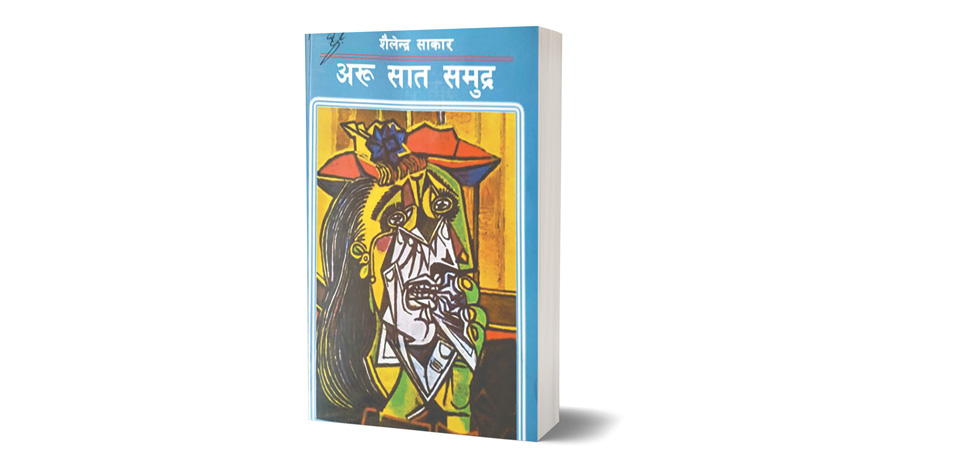Sakar's Metaphor-laden ‘Seven Oceans’

Gandhi Raj Kafle
A littérateur of higher stature in Nepal, Sailendra Sakar needs no introduction for Nepali readers. His genre is poetry writing and he loves to impart his fine touch to literature through his poetry.
Sakar has plenty of admirers. His under-reviewed book, "Aru Sat Samudra," has evoked nice reviews and comments from none other than the noted authors such as Pawan Alok, Bimal Niva, Biswo Sigdel and Hari Manjushree. They are not only ritualistic words of praise, but an indication of the real calibre, recognition and popularity of poet Sakar.
Sakar’s creative life is carried through the meaning of words of French poet and essayist Charles Baudelaire, "Always be a poet even in prose", which he has lovingly quoted in this book.
This freshly published collection of poems, which adds a new feather to the cap of Sakar's poetic journey, deals with chaotically emerged themes of our contemporary life. The way-out, as the poet writes, should be understood in metaphors. Sakar has applied this meaning even in the title of the book. The themes of life about which the poet writes in this anthology are hugely meaningful: they are like oceans – deep, vast, impactful and sometimes damaging, too.
The word ‘other or Aru’ in the book title meaningfully gives a hint about what kind of oceans the poet has talked about. And Sakar, surely, is here to caution the world poetically.
There are eighty-two poems in this collection. Compared to the 104-page of the book, the number of poems should be considered large. However, the book is composed of all short, medium and sometimes longer poems. However, Sakar has filled this anthology with symbols and metaphors of various sizes.
This is also a collection, which contains world poetic views. The two new experiences to shape ideas for the poet here are his visit to America and the compulsion for the world people to encounter the deadly emergence of the coronavirus. He does his poetic work with ease and gives artistic beauty to his words spontaneously through this anthology.
There are plenty of such examples. So, let's pick the meaning in the eighth poem entitled 'Which Dream Would You Search' (Kun Sapana Khojchhau). The question posed by the poet carries ocean-deep meaning: He raises an accusing finger at the rising number of rape cases and occurrences of deaths from road accidents with the appropriate reference of sunlight as an all-time witness. He raises questions using the words 'which dreams are you searching' is a praiseworthy poetic criticism.
Similarly, the poet has empowered his expression beautifully in the 'Desh One' and 'Desh Two' (Country One and Country Two) poems also. In the Desh One, the poet is inquisitive to redefine the meaning of country and he wants to see the beauty of the phenomenally changing life of an individual. He insists in this poem that the country is like buds of plants that keep growing and supports an individual in his quest to discover new meaning. But, is everything all right? The country's definitions are phenomenally changing. In this condition, the poet feels the Desh or the country the father or mother had taught in boyhood is not in existence. What has emerged in the process is a new country which can be seen and felt painfully because youths have left for abroad. This condition, metaphorically, makes the poet confused and there is a poetic beauty in this confusion.
Poet Sakar's metaphors here denote a country, which lives lovingly and respectfully in the existence of sentiment. So, here he has shaped the definition accordingly. He says the country also possesses features to flow, but it sometimes takes solid form, too, and, if needed, it can also take a flight to new highs every time.
Desh Two’s these lines are interesting in metaphors and expression:
One Mountain walks with me always
One river walks with me always
The stone that fell from the mountain
Becomes a hill and rises again
From Page 82: Desh - 2 Poet Sakar's beloved country is Nepal and Bhojpur District, the birth-place of the poet, is sacred like 'Janani Janmabhumischa' of sage Balmiki of the Ramayana. So, with these sentiments, he is demanding some precious things without referring to the name of his country and only with metaphors.
In conclusion, this anthology of poems is true 'The Other Seven Ocean'. Here the poems are built with the poet's oceans of sentiments. In these oceans, poet Sakar drops multiple messages of contemporary life and situations. There are complications in our technology-savvy world and he cautions us about the dwindling values of our generation for which we should be aware.
Recent News

Do not make expressions casting dout on election: EC
14 Apr, 2022
CM Bhatta says may New Year 2079 BS inspire positive thinking
14 Apr, 2022
Three new cases, 44 recoveries in 24 hours
14 Apr, 2022
689 climbers of 84 teams so far acquire permits for climbing various peaks this spring season
14 Apr, 2022
How the rising cost of living crisis is impacting Nepal
14 Apr, 2022
US military confirms an interstellar meteor collided with Earth
14 Apr, 2022
Valneva Covid vaccine approved for use in UK
14 Apr, 2022
Chair Prachanda highlights need of unity among Maoist, Communist forces
14 Apr, 2022
Ranbir Kapoor and Alia Bhatt: Bollywood toasts star couple on wedding
14 Apr, 2022
President Bhandari confers decorations (Photo Feature)
14 Apr, 2022











